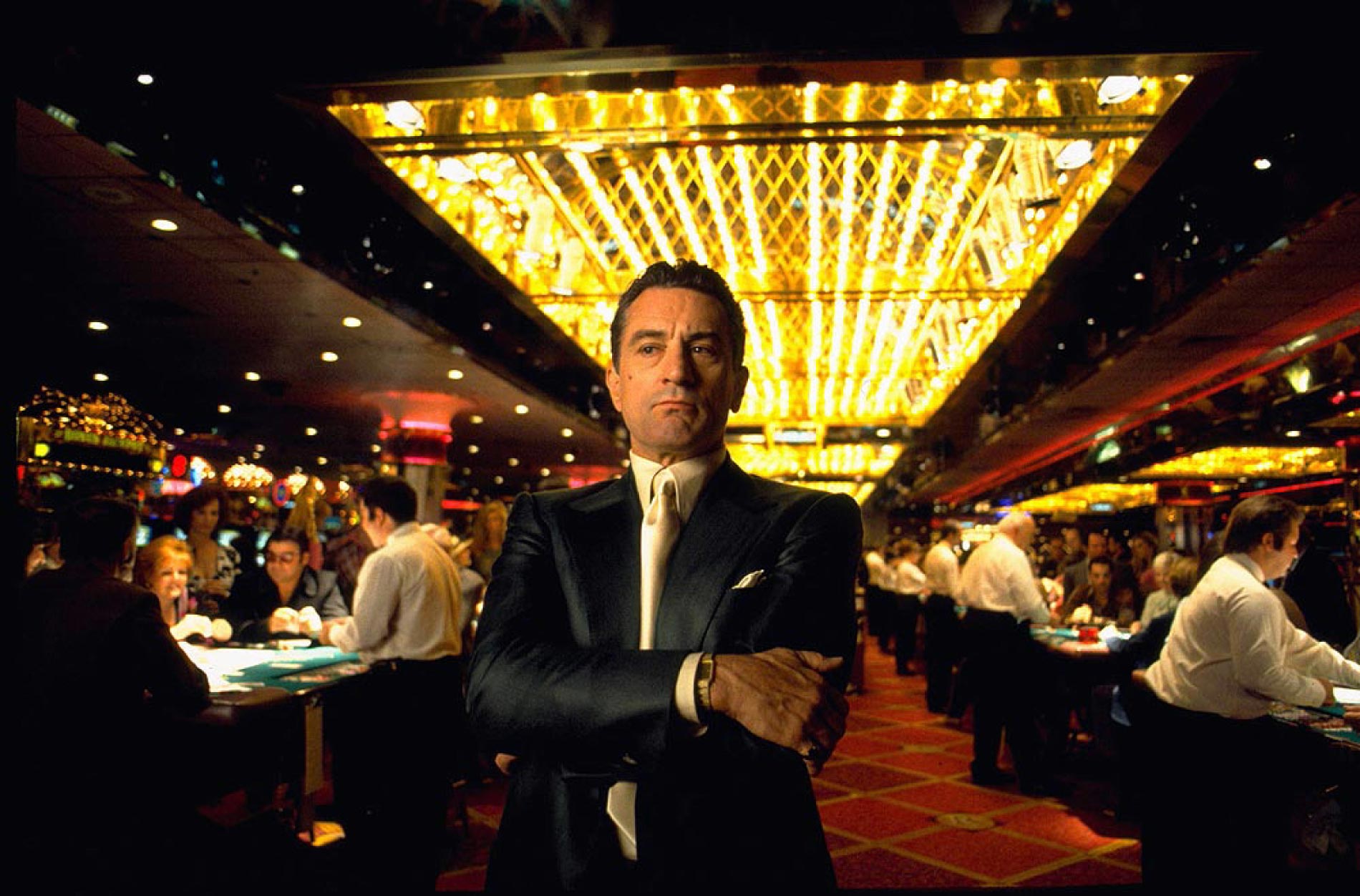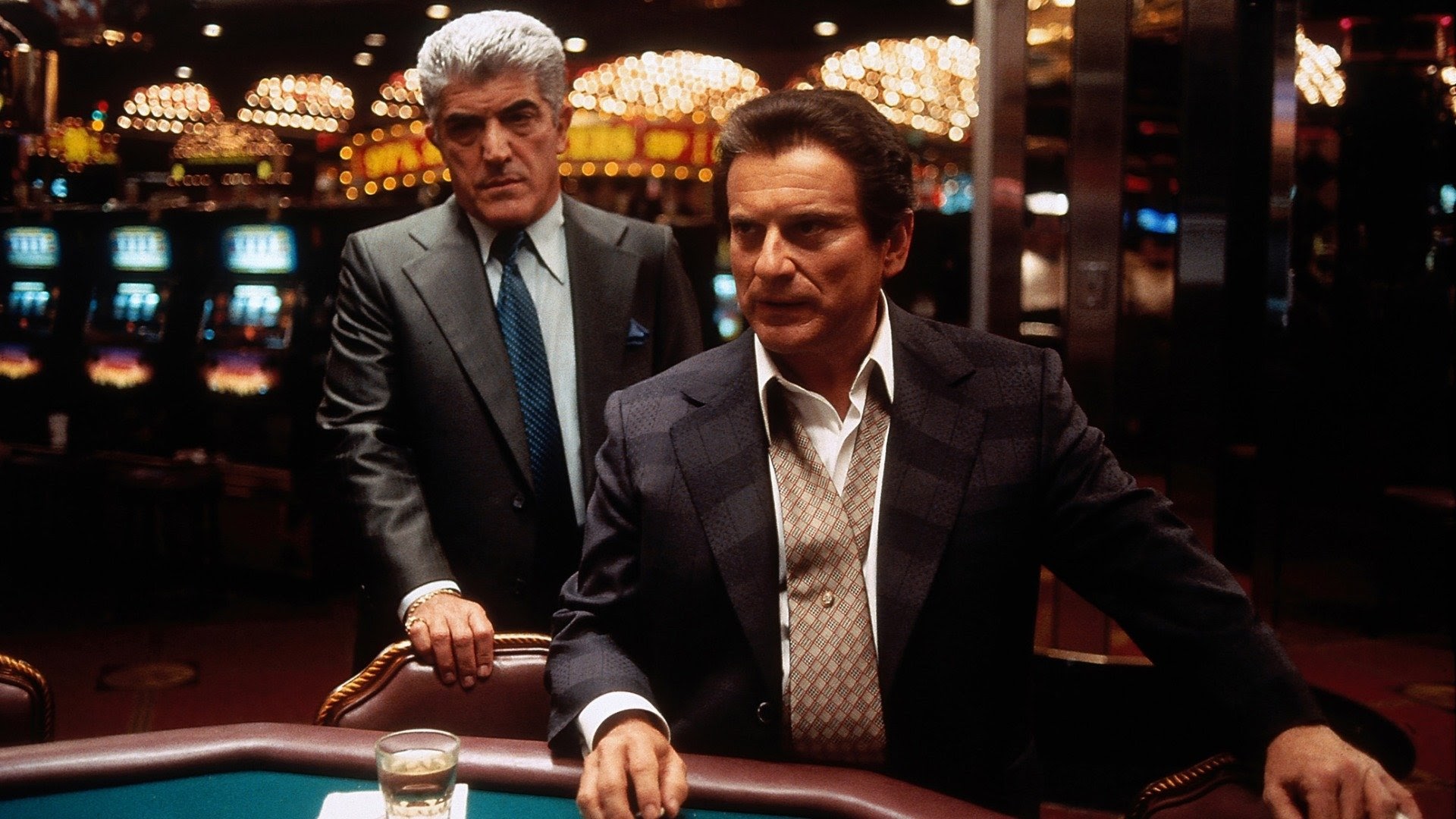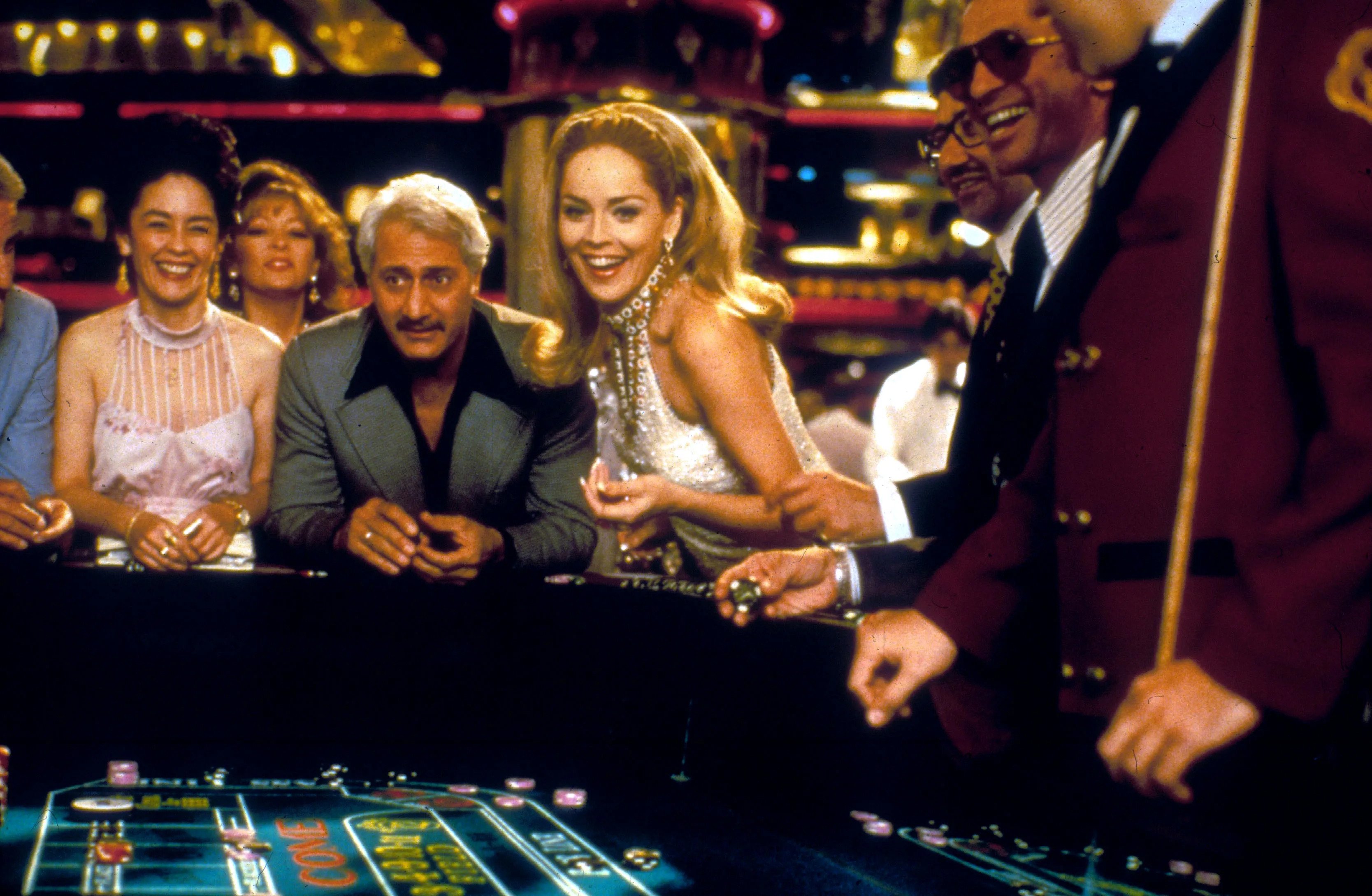Martin Scorsese’s Casino begins with hellfire.
Sammy “Ace” Rothstein (Robert De Niro) leaves the casino that he operates and walks to his car. As he starts the engine, the bomb planted under the passenger’s seat ignites. Ace is consumed by fire. The opening credits, designed by Elaine and Saul Bass and set to the closing movement of Johann Sebastian Bach’s St Matthew Passion, imagine Ace propelled through a Las-Vegas-themed inferno. It’s a man’s body thrown through a sea of fire and neon.
Scorsese revisits that scene towards the climax of Casino. Ace explains that the car bomb was not lethal. Because of how the bomb was planted and the design of the car, Ace can actually escape the vehicle before it explodes. His suit jacket catches fire, but he is not even burnt. As such, Scorsese reframes that opening credits sequence as even more allegorical than it initially appeared. Ace’s body has been untouched by the flames, but his soul has not been so lucky.
When it premiered in 1995, reviews often framed Casino as an inferior copy of Scorsese’s Goodfellas. Gene Siskel opined that it broke “no new ground for Scorsese,” while Desson Howe argued that Scorsese was “trying to disinter the success of Goodfellas.” Even Empire’s positive review jokingly pondered whether Casino should have been considered “Goodfellas Part II?” Casino’s reputation has only grown in the years since, but the criticism still sticks.
It’s easy to understand where these criticisms come from. Casino is a mob-centric crime movie directed by Martin Scorsese, released just half a decade after Goodfellas. It marks another collaboration between Scorsese and Goodfellas author Nicholas Pileggi. It reunites Scorsese with Robert De Niro and Joe Pesci, who had starred together for Scorsese in both Raging Bull and Goodfellas. Both films employ a similar voiceover narration to guide viewers through flashbacks.
However, Casino is a much richer film than these stock comparisons might suggest. Indeed, Casino feels like a point of intersection for a number of Scorsese’s recurring motifs and fascinations. There is a tendency to flatten the filmmaker’s career to “mob” movies like Mean Streets, Goodfellas, Casino, and The Irishman, but his body of work is much more diverse than such a description would allow. Casino is a crime movie, but it is also so much more.
For example, Casino is effectively a western, in the same way that something like Apocalypse Now is a western. It is the story of the mob expanding west in its own form of manifest destiny. It is a story of the lawless desert, and an untamed frontier. Ace’s narration makes it sound like he is bringing civilization to the local population. “In Vegas, I had to keep a few juiced-in local cowboys working,” he explains. “I mean, without us, these guys, they’d still be shoveling mule shit.”

For gangster Nicky Santoro (Joe Pesci), “Las Vegas was the fucking wild west.” Nicky blows into town like a hurricane. He even brings his own band of “desperados” with him, stealing safes out of walls. Casino is a retelling of the American foundational myth. Anybody can come to Las Vegas and reinvent themselves. Phillip Green (Kevin Pollak) was “an Arizona real estate hustler who barely had enough gas money” to make it to Las Vegas who ended up appointed chairman of the board of the Tangiers.
This fits with one of the other strands simmering through Scorsese’s filmography. Scorsese is a director fascinated with the intersection of American history and American mythology. The last film he’d made before Casino had been The Age of Innocence, an Edith Wharton adaptation set against the backdrop of 1870s New York. He would go on to make Gangs of New York and Killers of the Flower Moon, two more stories about the foundations of American identity.
There is something inherently self-aware in all of this. After all, the western archetype evolved in American consciousness. Over time, the cowboy became the outlaw. As modernity encroached, the outlaw became the gangster. Casino is in some ways a dramatization of that transition. The cowboy archetype is supplanted by the gangster. Just as the cowboy was rendered obsolete by the railroad, the gangster is displaced by the market forces of capitalism that turn Las Vegas into “Disneyland.”
However, Casino ties this mythmaking into another of Scorsese’s recurring interests. Scorsese is one of the great Catholic filmmakers. He even considered becoming a priest. Scorsese’s religious interest permeates his filmography. The director spent most of the 1980s struggling to get The Last Temptation of Christ made. He would make Silence later in his career. He is reportedly working on another movie about Jesus Christ. In broader religious terms, he followed Casino with Kundun, a film about the Dalai Lama.
Casino is not just a retelling of the classic western mythology. It is also a religious parable. This makes sense. The American fantasy of manifest destiny is rooted in religious imagery and ideology. Many of the early settlers believed that God had provided them with the continent as a mark of their exceptionalism. John Winthrop evoked this idea in his sermon in which he described America as “a city upon a hill,” which Ronald Reagan repurposed in his invocation of a “shining city on a hill.”
Casino weds these two themes together by suggesting that Ace and Nicky have found themselves in something approaching the Garden of Eden. Ace describes Las Vegas as “paradise on earth.” He speaks of the city’s redemptive power in explicitly religious terms. “For guys like me, Las Vegas washes away your sins,” he boasts. “It’s like a morality car wash. It does for us what Lourdes does for humpbacks and cripples.” In this context, it is perhaps worth noting that Ace is Jewish.

Casino ties this image of westward expansion to more explicitly religious iconography. Las Vegas seems like the Garden of Eden. “Ace saw Vegas one way,” Nicky recalls. “But I saw it another. I saw it as untouched.” It is a world free of original sin, in which gangsters like Nicky and hustlers like Ginger (Sharon Stone) seem to believe they can escape their pasts. This is a fiction, of course. Ace believes that he can reinvent and remake Ginger as his wife, but soon discovers his folly.
Just outside the city lies the desert. “At night, you couldn’t see the desert that surrounds Las Vegas,” Ace narrates. He then adds, “But it’s in the desert where lots of the town’s problems are solved.” Exile and expulsion from Las Vegas often means an eternity spent in a hole in that desert. The desert marks another point of intersection between the film’s western and religious subtext. The Israelites’ exile in the desert was a common touchstone for theories of manifest destiny.
Scorsese has acknowledged the religious subtext of Casino. “God gives them this paradise of sin, Las Vegas, and they can do anything and they screw it up,” he recounts. “And they’re cast out of the paradise.” He made the comparison in contemporary press, musing, “It’s like the Old Testament. It was so obvious they couldn’t see it coming.” The movie opens with the closing movement of Johann Sebastian Bach’s St Matthew Passion, which recounts the betrayal of Jesus Christ.
Writing in The Baltimore Sun, critic Stephen Hunter summarized Casino as the story of “two men who inherited the Garden of Eden and managed in a very short time to destroy everything for no more cogent reason than their own bitter and unmalleable pride, which goeth before the fall every darn time.” Both Ace and Nicky imagine themselves in a sacred and untouchable position, operating in a space where there is no divine or human judgment.
“You know what the best part is?” Nicky boasts of his plan to import mob violence to Las Vegas. “Nobody’s gonna know what we’re doing. There’s nobody here to see us. Everybody’s back home.” Of the bosses for whom Nicky and Ace ostensibly work, Nicky muses, “They were a thousand miles away, and I don’t know anybody who can see that far.” During his break-ins, Nicky even turns away the photos of the homeowners. “I didn’t like the people I was rippin’ off looking at me,” he explains.

Ace is just as anxious about being seen. He narrates a lot of the movie but, unlike Henry Hill (Ray Liotta) in Goodfellas, he never acknowledges the camera. He even wears big sunglasses, as if to hide his eyes from the audience’s gaze. When FBI agents show up with photographic evidence of an affair between Ginger and Nicky, he refuses to even acknowledge the images. “I didn’t want to look at them,” he muses. “I didn’t want to look at the guys who brought them either.”
This is reflected in the visual language of the film. As shot by cinematographer Robert Richardson, there is a murky quality to Casino. Much of the movie takes place in smoke-filled rooms, as if to suggest that something is being obscured. The edges of the frame are often dark and blurred, characters seeming to occupy strange empty spaces. In contrast, the characters themselves are often well-lit in contrast to their environment, given halos and sheens.
This is the tragedy of Casino. “Nicky thought nobody was watching him,” Ace recounts. “But he was wrong.” It turns out that the authorities are watching Ace and Nicky. As the film builds to its climax, both Ace and Nicky discover that they are subject to the rules that they thought they could ignore. Scorsese is an inherently Catholic filmmaker, and as much as critics might argue that his films “glamorize” violence, there is always a strong moral component to them.
At one point, Ace explains how the system works in the casino. “The dealers are watching the players,” he tells the audience. “The boxmen are watching the dealers. The floormen are watching the boxmen. The pit bosses are watching the floormen. The shift bosses are watching the pit bosses. The casino manager is watching the shift bosses. I’m watching the casino manager. And the eye in the sky is watching us all.” It is a none-too-subtle religious parable. Somebody is always watching.
At the end of the film, Nicky and Ginger are both dead. Ace has returned to his life as a sports handicapper. He has avoided the sort of punishment mandated by the Hays Code in the classic gangster movies that influenced Scorsese. He is not killed or imprisoned. Instead, his punishment is more spiritual and existential. Ace has been cast out of paradise. As he succinctly explains, “Paradise. We managed to really fuck it all up.” It is a bitter and cynical ending to the American fairytale.






Published: Oct 18, 2023 10:00 am